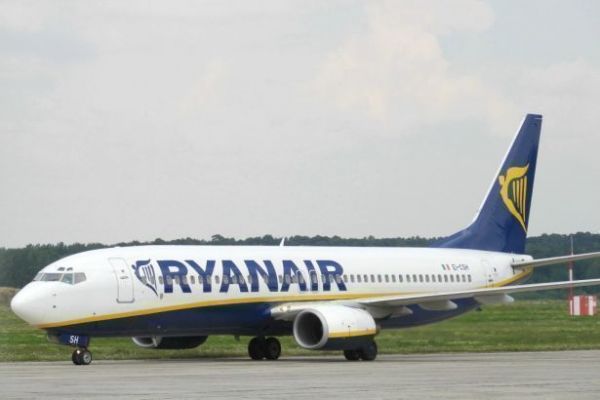Flights to and from the UK could be grounded and Britons limited to ferry journeys to Ireland and road trips to Scotland, Ryanair Holdings Plc said in its starkest comments yet about the possible fallout of Brexit for aviation if a wide-ranging deal isn’t secured in time.
Europe’s biggest discount airline extended its warning to the future of rival carriers, with chief executive officer Michael O’Leary suggesting that a failure to negotiate terms guaranteeing existing air services and accords could force British Airways owner IAG SA to sell its Spanish Iberia unit and render redundant EasyJet’s Plc’s new European operating license.
“It’s becoming more and more likely that there will be disruption to flights in April 2019,” O’Leary said Wednesday in London, citing lead times of six months or more in drawing up future timetables. “The airlines will be screaming blue murder through September-October of 2018 if there isn’t an agreement. At that point in time all hell is going to be breaking loose over here.”
Optimism among British politicians and UK airlines, including BA and EasyJet, suggesting a deal preserving the aviation status quo is inevitable is unfounded, the CEO said. The other 27 EU nations will require Britain to accept European Court of Justice jurisdiction over travel matters and cede oversight of flight-delay compensation to the European Parliament, he said, adding that “ownership restrictions are going to be a problem as well.” Those terms may prove unacceptable to many in the UK, lengthening negotiations, he argued.
With the focus of talks still on “precursor” issues such as the budget-settlement bill, industry concerns aren’t even on the agenda yet, O’Leary said. German and French airlines are also opposed to the UK getting a favorable outcome and are actively campaigning for a restrictive deal.
“I strongly recommend that you invest in Irish ferry shares or Scottish hotel accommodation stocks,” the CEO said, adding ironically that curbs on travel “doubtless will appeal to all those many millions who like to go to Spain, Portugal and Greece for cheap, sunny holidays.”
While O’Leary said he held a “very good” meeting with UK Transport Secretary Chris Grayling, who seems to understand “the urgency of the issue,” he added that Britain’s apparent belief that “no deal is better than a bad deal” gives few grounds for optimism.
In a worst-case scenario, “IAG may well be broken up in a hard Brexit,” he said. “BA would be forced to sell Iberia because a UK airline can’t own a European airline.” He added that EasyJet’s Austrian operating license, secured last month to allow it to continue flights within mainland Europe, could also “fall asunder”, because the Luton-based carrier could only own a minority of the air-operating certificate.
IAG said in emailed comments that it will continue to comply with relevant ownership and control regulations, adding, “We’re confident that a comprehensive air transport agreement between the EU and the UK will be reached. It’s in Europe’s interest to have a fully liberalised aviation agreement.” EasyJet said its Austrian AOC will be sufficient to operate intra-European flights and reiterated that airlines in mainland Europe all want to maintain services to the UK.
Grayling told Bloomberg on July 21 that there’s no chance flights will be grounded, saying it’s “inconceivable that anyone on either side would want to stop planes flying,” especially given the importance of UK tourists for many EU economies. The Department for Transport added Wednesday (August 2) that it regards aviation as “absolutely crucial” to the economy and that the government is committed to maintaining “liberal access to European aviation markets.”
Ryanair has said the threat to routes is especially acute because they’re governed by the European Court, so that an entirely new EU-UK arrangement would need to be negotiated. Without that, flights at best would be limited by earlier bilateral treaties typically dating from the 1980s that might, for example, restrict Ireland-London services to just three a day versus 30 now.
News by Bloomberg. Edited by Hospitality Ireland.









